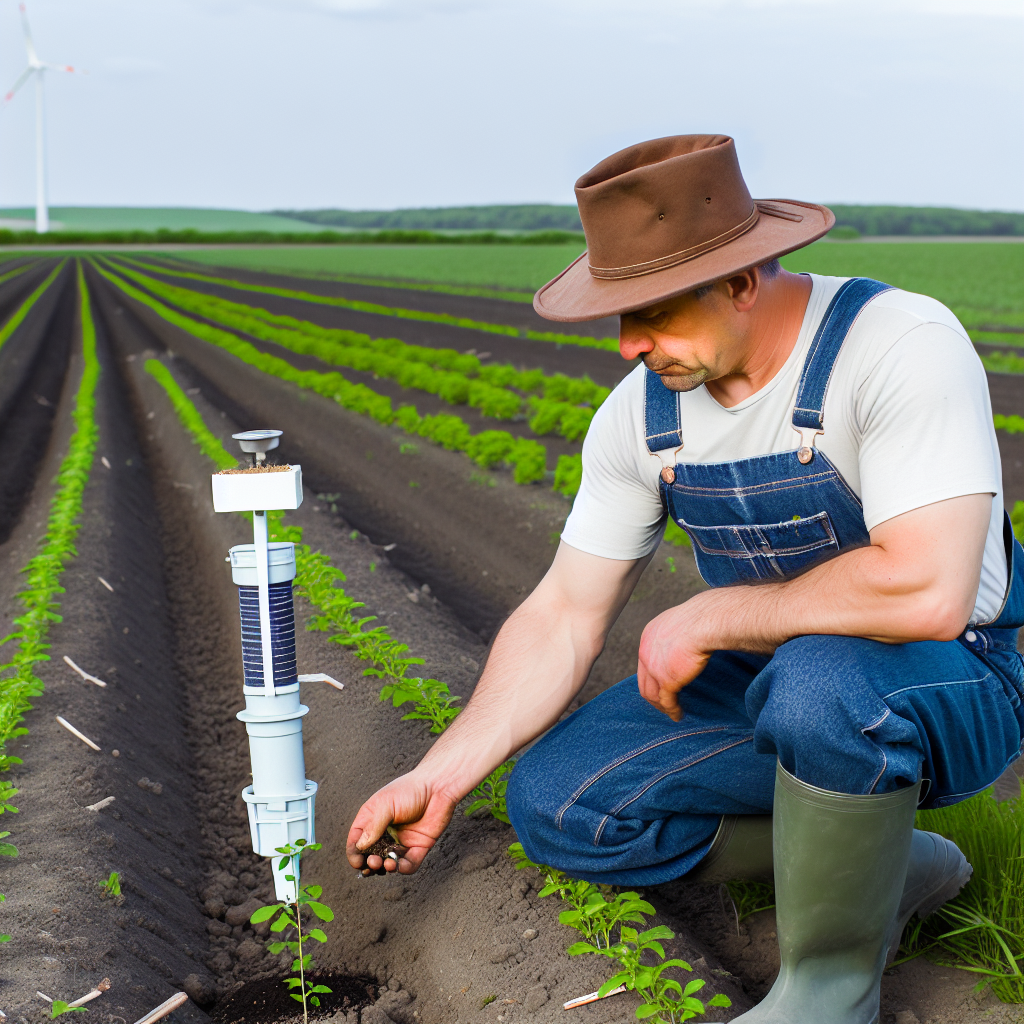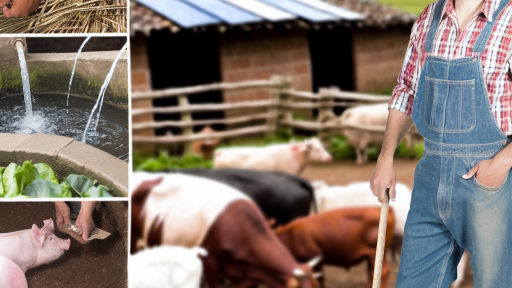Overview of Climate Resilience in Agriculture
Defining Climate Resilience
Climate resilience refers to the ability of agricultural systems to withstand climate-related shocks.
This includes extreme weather events, changing precipitation patterns, and rising temperatures.
A resilient agricultural system adapts to these changes, ensuring consistent food production.
The Importance of Climate Resilience
Resilient agriculture is essential for food security in a changing climate.
It protects farmers’ livelihoods by mitigating risks associated with climate variability.
Furthermore, it supports sustainable farming practices, enhancing ecosystem health.
Strategies for Enhancing Climate Resilience
Farmers can adopt several strategies to improve climate resilience.
- Diverse cropping systems reduce reliance on a single crop.
- Cover crops enhance soil health and prevent erosion.
- Water management practices conserve water and maximize efficiency.
Additionally, incorporating agroforestry can strengthen the ecosystem.
Lastly, utilizing climate-smart technologies can further enhance agricultural adaptability.
Case Studies of Successful Resilience Practices
Successful adaptations showcase effective climate resilience in agriculture.
In Kenya, farmers practice intercropping to mitigate drought impacts.
In Brazil, agroforestry systems improve biodiversity and carbon storage.
Such examples highlight the effectiveness of innovative strategies in diverse conditions.
Challenges to Implementing Resilience Practices
Despite their benefits, farmers face challenges in implementing resilience practices.
These may include financial constraints, lack of access to technology, and insufficient training.
Transform Your Agribusiness
Unlock your farm's potential with expert advice tailored to your needs. Get actionable steps that drive real results.
Get StartedMoreover, climate change impacts can outpace the adoption of new methods.
Future Directions for Climate Resilience in Agriculture
Future efforts should focus on education and accessibility to enhance climate resilience.
Collaboration between governments, NGOs, and the agricultural sector is vital.
Investment in research and development will also drive innovation in sustainable practices.
Importance of Sustainable Practices in Mitigating Climate Change
Enhancing Soil Health
Sustainable agricultural practices significantly enhance soil health.
They enrich the soil with organic matter.
This process improves nutrient retention and water absorption.
Consequently, healthier soils support more resilient crops.
Moreover, robust soils help sequester carbon, reducing greenhouse gases.
Conserving Water Resources
Water conservation is a critical aspect of sustainable agriculture.
Practices like drip irrigation minimize water usage efficiently.
This approach reduces wastage and lowers the demand for freshwater.
Furthermore, preserving water resources safeguards ecosystems.
Effective water management supports crop resilience to drought.
Promoting Biodiversity
Promoting biodiversity is vital for healthy ecosystems.
Sustainable farming encourages diverse plant and animal species.
This diversity enhances pest control and pollination services.
Additionally, diverse cropping systems are more resilient to climate variability.
In turn, biodiversity helps sustain agricultural yields over time.
Reducing Chemical Inputs
Reducing chemical inputs is essential for sustainable agriculture.
Organic farming practices utilize natural fertilizers and pesticides.
This strategy minimizes harmful impacts on the environment.
Furthermore, it protects the health of farmers and consumers alike.
Reducing chemical reliance also promotes ecosystem balance.
Showcase Your Farming Business
Publish your professional farming services profile on our blog for a one-time fee of $200 and reach a dedicated audience of farmers and agribusiness owners.
Publish Your ProfileAdapting to Climate Change
Sustainable practices enable farmers to adapt to changing climate conditions.
Crop rotation and agroforestry can mitigate risks associated with climate extremes.
These practices enhance resilience against pests and diseases.
Moreover, they contribute to overall agricultural sustainability.
By adapting, farmers can ensure food security for future generations.
Key Climate Change Impacts on Agriculture
Rising Temperatures
Higher temperatures affect crop growth and development.
These changes can lead to reduced yields for various crops.
Heat stress can significantly impair plant health.
Farmers must adapt to ensure resilient crop production.
Altered Precipitation Patterns
Climate change is causing shifts in rainfall distribution.
Some regions experience increased rainfall while others face drought.
Therefore, water availability for irrigation becomes unpredictable.
To cope, farmers need to implement efficient water management practices.
Increased Frequency of Extreme Weather Events
Severe storms and flooding are becoming more common.
These events can devastate crops and erode soil health.
Farmers must develop strategies to mitigate damage from such incidents.
Planning for recovery post-disaster is crucial for agricultural stability.
Pest and Disease Proliferation
Warmer conditions may expand pest ranges and increase infestation rates.
This results in greater challenges for crop protection.
Farmers must remain vigilant to manage pests and diseases effectively.
Integrated pest management strategies will be vital in this regard.
Soil Degradation
Climate change exacerbates soil erosion and degradation.
This undermines the foundation of productive agriculture.
Implementing sustainable soil practices is critical for food security.
Such practices include cover cropping and reduced tillage.
You Might Also Like: How Farms Supply Fresh Produce to Schools
Innovative Agricultural Practices for Climate Resilience
Embracing Regenerative Agriculture
Regenerative agriculture focuses on restoring soil health.
This approach uses techniques like cover cropping and reduced tillage.
Ultimately, it enhances biodiversity and water retention.
Farmers like Elena Martinez implement this practice effectively.
Benefits include increased crop resilience to climate changes.
Utilizing Agroforestry
Agroforestry integrates trees into agricultural landscapes.
This method improves soil quality and reduces erosion.
It also provides shade and habitat for diverse species.
Farmers who use agroforestry often see higher yields.
Moreover, it enhances carbon sequestration and biodiversity.
Implementing Precision Agriculture
Precision agriculture leverages technology for better decisions.
It employs data analytics and GPS technology.
This approach helps farmers optimize resource use.
As a result, they reduce waste and inputs effectively.
Showcase Your Farming Business
Publish your professional farming services profile on our blog for a one-time fee of $200 and reach a dedicated audience of farmers and agribusiness owners.
Publish Your ProfileFarmers can respond swiftly to environmental changes.
Advancing Organic Farming
Organic farming excludes synthetic fertilizers and pesticides.
This process fosters healthier ecosystems and soil microbiomes.
Consequently, it enhances crop resilience to pests and diseases.
Many consumers prefer organic produce for its health benefits.
By expanding organic practices, farmers support sustainable growth.
Integrating Climate-Smart Practices
Climate-smart practices focus on adaptive measures for agriculture.
They minimize emissions while improving productivity.
Farmers can choose drought-resistant crop varieties.
Additionally, they can adopt efficient irrigation systems.
Thus, they maintain yields despite erratic weather patterns.
Employing Water Management Strategies
Water management strategies are crucial for climate resilience.
Farmers can implement rainwater harvesting systems.
Furthermore, drip irrigation promotes efficient water use.
Proper management increases agricultural sustainability significantly.
Less water waste leads to improved crop performance.
Collaborating for Community Resilience
Community collaboration strengthens agricultural resilience.
Shared resources and knowledge facilitate effective practices.
Groups like the Sustainable Farming Network provide support.
Workshops and training foster innovative solutions.
Ultimately, united efforts yield better outcomes for farmers.
Gain More Insights: Educational Benefits of Farm-to-School Initiatives
Role of Technology in Enhancing Climate Resilience
Precision Agriculture
Precision agriculture optimizes resource use and increases crop yields.
This technology utilizes data analytics to monitor field conditions.
Farmers can make informed decisions based on real-time data.
As a result, they can adjust practices to minimize waste.
Climate-Smart Innovations
Innovations such as drought-resistant crops help farmers adapt.
These crops thrive in changing climate conditions.
Furthermore, they contribute to food security.
Farmers also benefit from reduced water consumption.
Remote Sensing and Drones
Remote sensing technology provides vital information about crop health.
Drones offer a bird’s-eye view of agricultural fields.
Farmers can identify issues early, preventing potential losses.
This proactive approach enhances overall farm management.
Data-Driven Decision Making
Data analytics plays a crucial role in sustainable practices.
Farmers analyze weather patterns and soil conditions.
Consequently, they can implement appropriate interventions.
This helps to maximize productivity while minimizing environmental impact.
Renewable Energy Utilization
Using renewable energy sources increases agricultural sustainability.
Solar panels and wind turbines power farming operations efficiently.
Showcase Your Farming Business
Publish your professional farming services profile on our blog for a one-time fee of $200 and reach a dedicated audience of farmers and agribusiness owners.
Publish Your ProfileThis reduces reliance on fossil fuels and decreases carbon emissions.
Implementing these technologies supports agroecological practices.
Uncover the Details: Local Food Sourcing Trends Every Farmer Should Know

Case Studies of Successful Climate-Resilient Farms
The Green Valley Farm Initiative
The Green Valley Farm demonstrates innovative water management techniques.
This farm uses drip irrigation to reduce water consumption significantly.
Moreover, it incorporates rainwater harvesting systems to enhance resilience.
The farmers engage in crop rotation to improve soil health and biodiversity.
Through these practices, they sustain productivity despite changing climate conditions.
Sustainable Agroforestry in Maple Grove
Maple Grove uses agroforestry systems to promote ecosystem health.
This approach combines trees with agricultural crops, enhancing biodiversity.
The farm benefits from improved soil quality and reduced erosion.
Additionally, the diverse plant species attract beneficial insects.
Farmers report increased yields and resilience to pests and diseases.
Urban Agriculture at City Harvest
City Harvest transforms urban spaces into productive green farms.
This initiative uses vertical farming techniques to maximize crop output.
Community participation strengthens local food systems and sustainability.
The farm employs composting practices to minimize waste and enhance soil.
Overall, City Harvest exemplifies successful urban adaptation to climate challenges.
Family Roots Organic Farm
Family Roots emphasizes organic farming practices to mitigate climate impact.
Their use of cover crops improves soil fertility and prevents erosion.
This farm also relies on integrated pest management for crop protection.
By reducing chemical inputs, they promote environmental health and sustainability.
The family farm thrives through community-supported agriculture initiatives.
Explore Further: Building a Local Food Network on Your Farm
Policy Approaches to Support Sustainable Agriculture and Climate Resilience
Government Incentives
Governments can provide financial incentives for sustainable practices.
These incentives encourage farmers to adopt eco-friendly methods.
For instance, tax credits can reward farmers who implement conservation measures.
Additionally, grants can fund innovative projects that enhance soil health.
In this way, policy measures promote a shift toward sustainable agriculture.
Education and Training Programs
Education is key to enhancing climate resilience in agriculture.
Training programs can teach farmers about sustainable techniques.
Experts recommend workshops to promote best practices in crop management.
Furthermore, local universities can offer resources for ongoing training.
As a result, farmers become more aware of climate impacts on agriculture.
Research and Development Funding
Investing in agricultural research supports sustainability initiatives.
Government bodies can allocate funds for developing resilient crop varieties.
Research can also focus on pest management practices that are environmentally friendly.
Moreover, universities and agricultural institutions play a crucial role in this area.
Targeted R&D enhances the adaptability of agriculture.
Collaboration with Private Sector
Partnerships between government and private entities can drive innovation.
Showcase Your Farming Business
Publish your professional farming services profile on our blog for a one-time fee of $200 and reach a dedicated audience of farmers and agribusiness owners.
Publish Your ProfileCompanies can develop advanced technologies that support sustainable farming.
By working together, stakeholders can create comprehensive solutions.
For example, agtech firms can provide tools for precision agriculture.
This collaboration ultimately boosts productivity while safeguarding resources.
Regulatory Frameworks
Clear regulations are essential for promoting sustainable agricultural practices.
Policies must set standards for environmental protection in agriculture.
By enforcing these standards, regulatory bodies can minimize ecological damage.
Additionally, certification programs can recognize sustainable farms.
Such measures enhance market access for environmentally responsible producers.
Community Engagement
Encouraging community involvement fosters local resilience.
Farmers can participate in local decision-making processes related to agriculture.
Moreover, community-supported agriculture models promote local food systems.
These initiatives strengthen connections between consumers and producers.
This engagement ultimately supports sustainable practices at the grassroots level.
Future Directions for Research and Development in Sustainable Farming
Innovative Agricultural Technologies
Emerging technologies will transform sustainable agriculture.
Precision agriculture enhances resource efficiency.
Remote sensing technology can monitor crop health effectively.
Additionally, data analytics will improve decision-making processes.
Developing biotechnologies helps create resilient crop varieties.
Furthermore, innovations in water management will optimize usage.
Climate Adaptation Strategies
Research should focus on climate-resilient practices.
Agroforestry systems can provide ecological benefits.
Diversity in cropping systems increases resilience to climate variability.
Moreover, integrating traditional knowledge into modern practices is essential.
Farmers can adapt through implementing sustainable land management techniques.
Policy and Community Engagement
Effective policies must support sustainable agricultural practices.
Engagement with local communities is vital for successful implementation.
Creating awareness programs can educate farmers about sustainability.
Collaboration among stakeholders fosters innovation and knowledge sharing.
Incentives for adopting sustainable methods can drive change.
Research on Soil Health
Soil health is fundamental for sustainable crop production.
Research should focus on the benefits of organic amendments.
Cover cropping enhances soil structure and nutrient availability.
Integrating soil health assessments into farming practices is crucial.
Long-term studies will provide insights into sustainable soil management.
Market Access and Economic Viability
Ensuring market access is critical for sustainable farming success.
Research can identify barriers to entry for small-scale farmers.
Developing cooperatives can improve bargaining power.
Promoting direct-to-consumer models can enhance profitability.
Furthermore, assessing the economic impacts of sustainability practices is essential.
Showcase Your Farming Business
Publish your professional farming services profile on our blog for a one-time fee of $200 and reach a dedicated audience of farmers and agribusiness owners.
Publish Your ProfileAdditional Resources
Climate-Smart Agriculture and Forestry Resources | Farmers.gov




